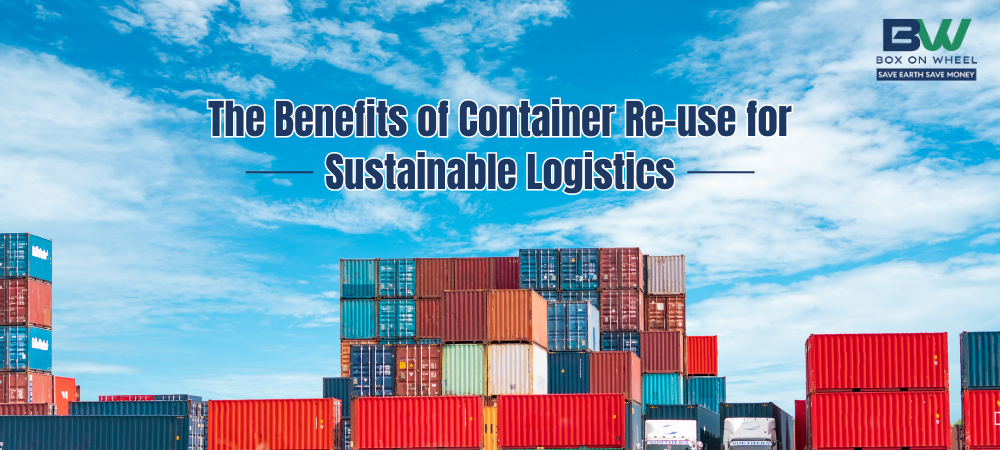Container reuse involves repurposing shipping containers across multiple shipments instead of returning them empty. For India’s logistics sector, where logistics costs can consume up to 13% of GDP, this isn’t just a sustainable move but a strategic one. Empty container returns contribute to unnecessary costs and environmental strain. Reusing containers offers an effective solution, enabling logistics firms to reduce these impacts while gaining efficiency.
The Environmental Impact of Reusing Containers
- Lowering Carbon Emissions: Imagine if a fraction of the 20 million empty containers in India could be put to better use instead of making empty trips. Studies indicate that reusing just 5% of these containers could cut CO₂ emissions by around 100,000 tons each year. This is significant, considering that each container journey often covers distances of 100 km or more. By optimizing trips, companies play an active role in cutting down carbon footprints.
- Reducing Fuel Consumption: When containers are reused, the number of trips made by trucks and ships with empty loads decreases. This means less fuel burned. A logistics company that adopted container reuse saved over 1,600 liters of diesel in a year—a reduction equivalent to 4,300 kg of CO₂ emissions. These savings are particularly critical in India, where fuel efficiency remains a challenge due to outdated vehicles and infrastructure.
- Decreasing Waste: Every reused container is one less discarded or destroyed. The logistics industry’s shift toward a circular economy, where resources are repeatedly cycled rather than disposed of, gains traction with container reuse. This reduces landfill strain and the need for new materials to manufacture more containers.
Financial Gains of Container Reuse
The economic benefits of container reuse extend beyond environmental goodwill; they can transform a company’s bottom line.
- Operational Cost Savings: By reducing empty returns and maximizing load utilization, companies can save significantly. Firms that have incorporated container triangulation—a strategy that efficiently reroutes containers based on demand—have reported transportation cost savings as high as 30%. This directly boosts profitability while enabling competitive pricing.
- Enhanced Efficiency: Container triangulation allows logistics firms to position containers strategically based on demand, minimizing time and effort wasted in unnecessary trips back to depots. The streamlined approach improves delivery times, helping businesses meet customer expectations in a timely manner.
- Competitive Advantage: Consumers and clients are increasingly eco-conscious, with many favoring companies that prioritize sustainability. Adopting practices like container reuse doesn’t just save money; it distinguishes companies as leaders in sustainable logistics, appealing to clients who value environmental responsibility.
Box on Wheels Pioneering Container Reuse
Across India, logistics firms are gradually embracing container reuse in innovative ways:
- Container Triangulation: Companies offering triangulation services move containers from location to location without requiring an empty return, maximizing container use and reducing congestion. In urban areas, where traffic and space constraints complicate logistics, these services have proved particularly beneficial.
- Collaboration with Tech Firms: Logistics companies are also partnering with technology providers to improve container tracking and management. Enhanced tracking offers real-time data on container location, status, and usage patterns, allowing companies to maximize efficiency and ensure containers are always used when possible.
- Government Support: The Indian government is starting to recognize the role of sustainable practices in logistics. Through policies promoting container reuse, they are encouraging the sector to adopt practices that reduce carbon emissions and promote resource conservation as part of a larger push for environmental reform.
Moving Forward: A Sustainable Future for Logistics with Conatiner Re-Use
Container reuse represents a promising avenue for making Indian logistics more sustainable and cost-effective. Adopting practices like container triangulation isn’t just about lowering costs or reducing emissions; it’s about creating resilient supply chains that can meet the demands of environmentally conscious consumers and align with emerging regulatory expectations.
For logistics firms, embracing container reuse is an opportunity to drive efficiency, cut costs, and build a reputation for sustainability, an increasingly crucial asset in today’s market. As more companies adopt container reuse and the necessary infrastructure evolves, India’s logistics industry is poised to lead a shift towards a more sustainable, efficient future.
In the end, container reuse is not just a tactical move but an essential part of a broader, forward-thinking logistics strategy. For Indian logistics, sustainability is no longer just an option; it’s a competitive edge.
Sources
[1] https://wr1.com.vn/reuse-empty-containers-cost-optimization-reduce-co2-emissions/
[2] https://rotom.co.uk/articles/post/learn-4-principles-of-sustainable-packaging-logistics
[3] https://www.inboundlogistics.com/articles/reuse-service-of-use-to-container-shippers/
[6] https://www.sciencedirect.com/science/article/abs/pii/S1366554514001136
[7] https://naeco.com/en/news/why-reuse-is-essential-to-supply-chain-success/
[8] https://getsimplebox.com/shipping-container-sustainability/

